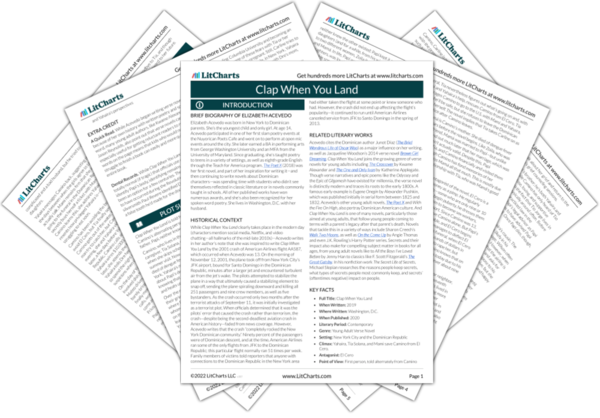The beach where Camino swims symbolizes her changing relationship to the Dominican Republic and her family’s roots in the country. Swimming at the beach is Camino’s happy place; it’s where she feels free, safe, and fulfilled. It’s also where she can connect with memories of both Mamá and Papi, as she has fond memories of spending time with both of her parents on the beach. In this sense, the beach is a positive symbol of the Dominican Republic for Camino: it represents her love of the people, the land, and her heritage.
After Papi’s death, though, Camino’s relationship to the beach—and to the Dominican Republic more broadly—becomes more fraught. Papi has been paying a known pimp named El Cero to leave Camino alone for several years, but without Papi around to pay up, El Cero begins stalking and harassing Camino, often at the beach. El Cero’s harassment corrupts the happy memories and associations Camino has with the beach. Now, when Camino runs into El Cero on the beach, it’s a constant reminder that she’s in danger if she remains in the country and continues to swim on her beloved beach.
It’s significant that on the night Camino runs away with Yahaira’s passport with plans to immigrate to the U.S. on her own, Camino’s last stop before the airport is the beach. She wants to say goodbye to all her happy memories of Mamá, Papi, and the Dominican Republic. But El Cero corrupts Camino’s bittersweet goodbye on the beach by attempting to rape her, further underscoring the reality that for her own safety, Camino cannot stay in the Dominican Republic. It’s this traumatic event that finally pushes Mami move up Camino’s visa appointment so that Camino can accompany them to the U.S. In this way, the beach symbolizes how Camino’s relationship to her roots has changed—though Camino loves the beach and the Dominican Republic, she nevertheless must leave them behind for her safety and in order to achieve her dreams.
The Beach Quotes in Clap When You Land
If you are not from an island,
you cannot understand
what it means to be of water:
to learn to curve around the bend,
to learn to rise with rain,
to learn to quench an outside thirst
while all the while
you grow shallow
until there is not one drop
left for you.
I know this is what Tía does not say.
Sand & soil & sinew & smiles:
all bartered. & who reaps? Who eats?
Not us. Not me.
[…] & here we are: Tía like a bishop,
slashing her long machete. Mami, the knight with rims. My body
in front of my sister’s body: queens.
Papi, who I know is here too. He did
build that castle he always promised.
I skim my feet in the water, with my face stroked by the sun
& pretend it is my father hands on my skin
saying sorry I love you welcome home goodbye.
I forgive you. I forgive you. I forgive you.
Say the waves. Say I.












